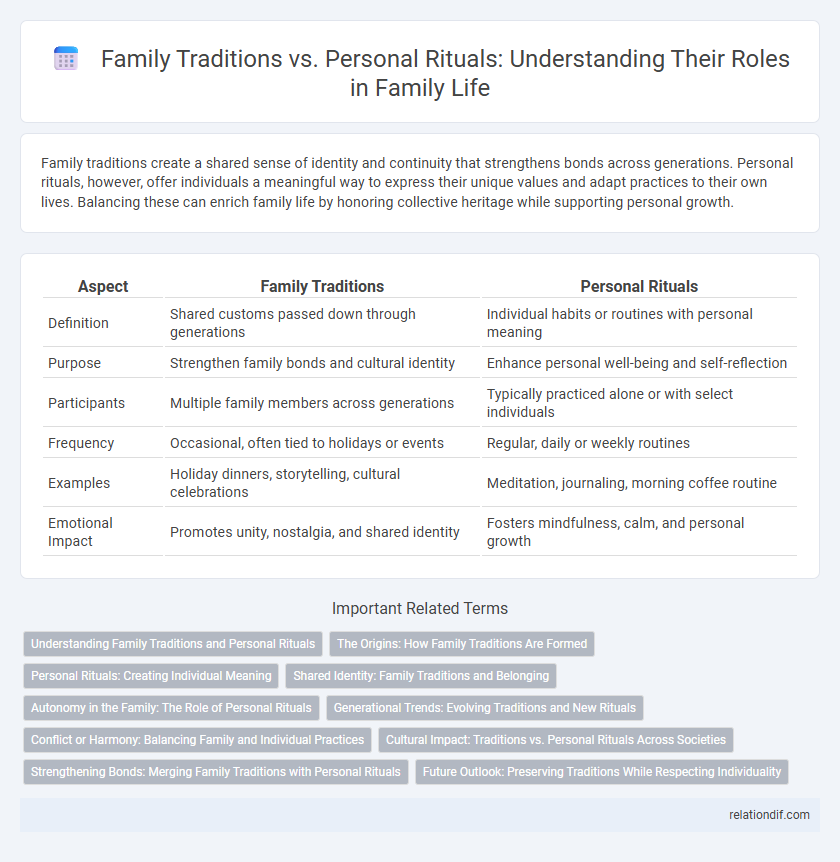Family traditions create a shared sense of identity and continuity that strengthens bonds across generations. Personal rituals, however, offer individuals a meaningful way to express their unique values and adapt practices to their own lives. Balancing these can enrich family life by honoring collective heritage while supporting personal growth.
Table of Comparison
| Aspect | Family Traditions | Personal Rituals |
|---|---|---|
| Definition | Shared customs passed down through generations | Individual habits or routines with personal meaning |
| Purpose | Strengthen family bonds and cultural identity | Enhance personal well-being and self-reflection |
| Participants | Multiple family members across generations | Typically practiced alone or with select individuals |
| Frequency | Occasional, often tied to holidays or events | Regular, daily or weekly routines |
| Examples | Holiday dinners, storytelling, cultural celebrations | Meditation, journaling, morning coffee routine |
| Emotional Impact | Promotes unity, nostalgia, and shared identity | Fosters mindfulness, calm, and personal growth |
Understanding Family Traditions and Personal Rituals
Family traditions are collective practices passed down through generations, fostering a shared identity and cultural continuity. Personal rituals, in contrast, are individual routines that provide personal meaning and emotional balance. Recognizing the interplay between family traditions and personal rituals enhances emotional well-being and strengthens familial bonds.
The Origins: How Family Traditions Are Formed
Family traditions are formed through shared experiences and collective memories passed down across generations, often rooted in cultural, religious, or historical contexts. These traditions create a sense of identity and continuity, reinforcing the family unit through repeated practices such as holiday celebrations, storytelling, or communal meals. Personal rituals, by contrast, develop from individual preferences and personal meaning, reflecting unique habits that complement but do not replace the broader framework of family customs.
Personal Rituals: Creating Individual Meaning
Personal rituals offer unique opportunities for self-expression and individual meaning beyond shared family traditions. These practices, such as journaling, meditation, or solo walks, nurture personal growth and emotional well-being. Cultivating personal rituals strengthens identity while complementing the collective values upheld in family traditions.
Shared Identity: Family Traditions and Belonging
Family traditions create a shared identity by reinforcing values and collective memories that bind members across generations. These rituals foster a sense of belonging and continuity, strengthening emotional connections within the family unit. Personal rituals, while individually meaningful, often complement family traditions by highlighting unique identities without diluting communal bonds.
Autonomy in the Family: The Role of Personal Rituals
Personal rituals in family life enhance individual autonomy by allowing members to express their unique identities within shared spaces, fostering self-discovery and emotional well-being. These practices complement family traditions by offering flexibility and personal meaning, creating a balance between collective heritage and personal growth. Emphasizing autonomy through personal rituals contributes to healthier family dynamics and stronger interpersonal relationships.
Generational Trends: Evolving Traditions and New Rituals
Generational trends reveal how family traditions adapt, blending longstanding customs with emerging personal rituals that reflect individual values and contemporary lifestyles. These evolving practices often symbolize a dynamic interplay between heritage preservation and personal expression, fostering a unique cultural identity within families. Embracing new rituals alongside traditional ones strengthens family bonds by honoring the past while accommodating change.
Conflict or Harmony: Balancing Family and Individual Practices
Balancing family traditions and personal rituals often creates tension as collective customs may clash with individual beliefs and preferences, requiring open communication to navigate differences. Harmonizing these practices strengthens family bonds while allowing personal growth by respecting unique identities within a shared cultural framework. Successful integration fosters a supportive environment where family heritage and individual expression coexist and enrich each other.
Cultural Impact: Traditions vs. Personal Rituals Across Societies
Family traditions serve as cultural cornerstones that preserve communal heritage and strengthen societal bonds, while personal rituals reflect individual values and adaptability within those cultural frameworks. Across societies, traditions often dictate collective celebrations and rites of passage, reinforcing identity and continuity, whereas personal rituals provide a means for self-expression and emotional regulation tailored to individual needs. This dynamic showcases how cultural impact manifests through the balance of inherited practices and personal meaning-making in family life.
Strengthening Bonds: Merging Family Traditions with Personal Rituals
Merging family traditions with personal rituals fosters deeper emotional connections by honoring shared heritage while celebrating individual expression. This blend strengthens bonds through collective activities that create new, meaningful memories reflective of each member's unique identity. Balancing these practices enhances family unity and personal fulfillment, promoting lasting relationships built on respect and understanding.
Future Outlook: Preserving Traditions While Respecting Individuality
Balancing family traditions with personal rituals ensures the preservation of cultural heritage while honoring individual expression and growth. Emphasizing open communication fosters adaptability, allowing traditions to evolve alongside changing values and lifestyles. This approach cultivates a future where familial bonds remain strong without compromising personal freedom and identity.
family traditions vs personal rituals Infographic

 relationdif.com
relationdif.com